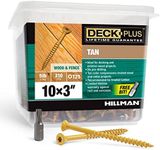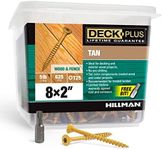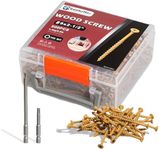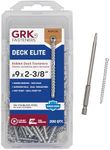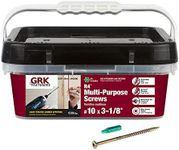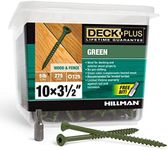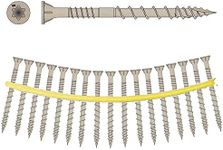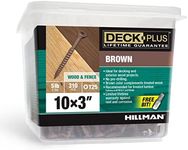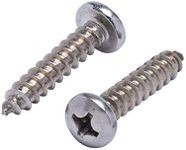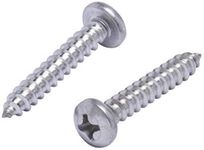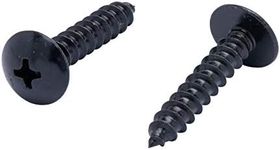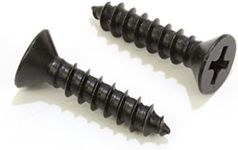Buying Guide for the Best Deck Screws
Choosing the right deck screws is crucial for the longevity and stability of your deck. Deck screws are specifically designed to hold decking materials together, and selecting the right ones can make a significant difference in the durability and appearance of your deck. When picking deck screws, consider the material, size, coating, and thread type to ensure they meet your specific needs and the conditions they will be exposed to.MaterialDeck screws are typically made from materials like stainless steel, coated steel, or brass. The material is important because it affects the screw's resistance to corrosion and its overall strength. Stainless steel screws are highly resistant to rust and are ideal for coastal areas or places with high humidity. Coated steel screws are treated to resist corrosion and are suitable for most general outdoor use. Brass screws are less common but can be used for their aesthetic appeal in certain applications. Choose the material based on the environmental conditions and the type of wood you are using.
SizeThe size of the deck screw, including its length and diameter, is crucial for ensuring a secure hold. Length is important because it determines how deeply the screw will penetrate the decking material and the joist below. Common lengths range from 1 1/4 inches to 4 inches. Diameter, often referred to as gauge, affects the screw's strength and holding power. Thicker screws (lower gauge numbers) are stronger but may be harder to drive in. For most decking projects, screws between 2 1/2 to 3 inches in length and 8 to 10 gauge are suitable. Consider the thickness of your decking boards and the type of wood when selecting the size.
CoatingThe coating on deck screws provides an additional layer of protection against corrosion and wear. Common coatings include galvanized, ceramic, and epoxy. Galvanized screws are coated with zinc to prevent rust and are suitable for general outdoor use. Ceramic-coated screws offer enhanced corrosion resistance and are ideal for more demanding environments. Epoxy-coated screws provide a durable finish that resists both corrosion and abrasion. Choose a coating based on the expected exposure to moisture and the longevity you desire for your deck.
Thread TypeThread type affects how well the screw grips the wood and how easily it can be driven in. Coarse threads are designed for softwoods and provide a strong hold with fewer turns. Fine threads are better for hardwoods and offer a smoother finish with less splitting. Some deck screws feature dual threads, with a coarse thread near the tip for quick penetration and a fine thread near the head for a tight finish. Consider the type of wood you are using and the desired ease of installation when selecting the thread type.
Head TypeThe head type of a deck screw determines how it sits in the wood and how easy it is to drive. Common head types include flat, bugle, and trim. Flat heads sit flush with the surface and are ideal for a smooth finish. Bugle heads have a slightly rounded top that helps distribute pressure and reduce splitting. Trim heads are smaller and less noticeable, making them suitable for applications where appearance is important. Choose the head type based on the finish you want and the ease of installation.
